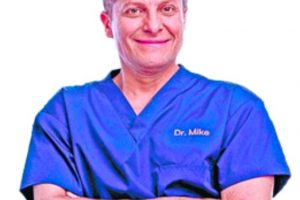Making the News
The world has questions, THI Council Members have answers
We are over 500 top specialists in one place, and our council is constantly making headlines, writing the news, and pushing policy. Want to know what we have to say? Read the news….
New York Times
Why Your New Year’s Diet Is Doomed
Featured Council Member: Mark Bittman
Nearly all of us will fail at our annual round of New Year’s resolutions, which historically are led by eating better and losing weight.
But the struggle for your health is not a battle between you and the scale, or you and the brownies.
CBS News
Speaking Frankly - Fat Shaming
Featured Council Member: David L. Katz, MD, MPH, FACPM, FACP, FACLM
Obesity on its own contributes to hundreds of thousands of premature deaths in the United States every year. If we factor in its contributions to all the major chronic diseases, the number is staggering. On the other side of the coin we see stigma and discrimination experienced by both children and adults with higher body weights and larger body sizes. This film examines the juxtaposition of “body shaming;” its effects on people; and obesity as the leading predictor of health outcomes in the modern age.
Frontiers in Nutrition
Editorial: Vegetarian Dietary Patterns in the Prevention and Treatment of Disease
Featured Council Member: Hana Kahleová, MD and David L. Katz, MD, MPH
Dietary patterns that emphasize the consumption of vegetables, fruits, whole grains and legumes, are recognized for their health-promoting properties (1). Such diets encompass vegetarian and vegan types, while extending to diverse, plant-predominant dietary patterns (2). Such diets are typically rich in fiber, antioxidants and phytochemicals, but much lower in saturated fat, added sugar, animal protein, and sodium compared to more conventional dietary patterns (3). The current 2015-2020 Dietary Guidelines for Americans recommend a vegetarian dietary pattern as one of three healthy dietary patterns, along with the Mediterranean and healthy U.S. style dietary patterns (4). Minimally processed plant foods are emphasized in all three, while only the vegetarian diet excludes meat entirely.
YOU the Owner's Manual Podcast with Michael Roizen, MD
Dr. Michael Roizen Interviews Dr. Katz on How to Eat
Featured Council Member: Michael Roizen, MD
The number of diets out there can be dizzying. What should you really be eating?
Dr. David Katz and coauthor Mark Bittman seek to provide that answer in their new book, How to Eat: All Your Food and Diet Questions Answered.
In the book, the duo shares their clear, no-nonsense perspective on food and diet, answering questions covering everything from basic nutrients to superfoods to fad diets.
Listen as Dr. Katz joins Dr. Roizen to discuss insights from the book and some of the “hot button” foods that are constantly in debate.
The New York Times
A Plan to Get America Back to Work
Featured Council Member: David L. Katz, MD, MPH, FACPM, FACP
One of the best ideas I have come across (for combating the spread of Coronavirus) was offered by Dr. David L. Katz, the founding director of Yale University’s C.D.C.-funded Yale-Griffin Prevention Research Center and an expert in public health and preventive medicine.
Katz wrote an Op-Ed in The Times on Friday that caught my eye. He argued that we have three goals right now: saving as many lives as we can, making sure that our medical system does not get overwhelmed — but also making sure that in the process of achieving the first two goals we don’t destroy our economy, and as a result of that, even more lives.
Cornell University College of Veterinary Medicine
Cornell Wildlife Health Center launched: because we need nature, and now nature needs us
Featured Council Member: Steve Osofsky, D.V.M.
At a critical time for the future of life on Earth, The College of Veterinary Medicine announces the establishment of the Cornell Wildlife Health Center. The new center focuses on catalyzing multidisciplinary collaboration to address wildlife health challenges worldwide, while immersing students in unique learning experiences at home and abroad.
Harvard Magazine
Healthy Plate, Healthy Planet
Featured Council Member: Frank Hu, MD, PhD
Frank Hu and Kentucky Fried Chicken arrived in Beijing around the same time. Hu, a recent graduate of Tongji Medical University, in Wuhan, had never seen a restaurant like it. Three-floored, gleaming, and distinctly Western in atmosphere, KFC proved irresistible to a country unfamiliar with the greasy efficiency of American fast food.
Medium
How Much Fat Should We Have in Our Diet?
Featured Council Member: David L. Katz, MD, MPH, FACPM, FACP
Even as the public health community wages a high-profile battle over how much processed meat it’s safe to eat, the community of vegan or plant-based nutrition experts has been waging a war of its own over the role of fat and its various sources in a plant-based diet.
NBC News
Daily and weekly tips to help prevent burnout at work
Featured Council Member: Dr. John La Puma
40 percent of employees surveyed said they experience moderate-to-severe burnout at work. Here are five things you can add to your routine to work smarter in 2020.
Prevention
What 10 Obesity Experts Wish You Knew About Weight Loss
Featured Council Member: Scott Kahn, MD
Weight loss advice is constantly coming at you—whether you ask for it or not. You might hear about it via the latest wacky plan some influencer tweets out, a buzzy bestselling book, or your judgey sister-in-law who has been eyeballing your body at every family gathering since your brother first brought her home. There is certainly no shortage of tips on how best to slim down.
The problem is, of course, that most of them are (low-fat) baloney, and won’t result in long-term, lasting weight loss. Research shows that almost half of all Americans have tried to lose weight within the last year, according to the Centers for Disease Control and Prevention, and many succeed. It’s keeping it off that’s a heck of a lot harder: A meta-analysis of 29 long-term studies showed that more than half the weight people lost had been regained at the two year mark, and by five years, folks had put 80% back on, according to a 2018 article in Medical Clinics of North America.










